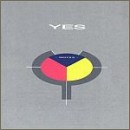 Yes
- "90125, 1983 (re-release)" Yes
- "90125, 1983 (re-release)" Rhino Records 2004 White and Squire were working on project Cinema. A new guitarist was bloody needed. On Chris's invitation Trevor Rabin steps in. Rabin was full of workaholic enthusiasm. He was hundred percent focused on Cinema. Founding Yes founder member, keyboardist Tony Kaye, rejoins his old band mate Chris, so there were three Yesmen together in same business. But this wasn't major shaking moment of this giant Yes metamorphosis. In fact in that time, there were no talks about Yes revitalisation. Imagine Anderson's vocal combined with distorted metal riffs. I was thinking: "This won't work!" And of course, I blew it! While stuff for Cinema project was in huge progress, Jon Anderson reunites with Squire and co. At first Rabin wasn't excited over that decision. He was sure White, Squire and he were as creative nucleus, brought together to work under a band called Cinema. But this new circumstances with Anderson under same flag, might be not so pleasant for Trevor. Will he be forced to copy Howe's mind processor of guitar playing? Things didn't go so far. All in this renewed Cinema line up were dying for some true change to happen. On Jon's proposal Cinema was renamed in Yes. And band was reborn. And it was Rabin the main article in pushing new style and sound designs. The rest of the gang gave him complete freedom for his musical expression and his fresh ideas were all integrated in this new Yes musical shape. Of course Yes were always looking for something fresh, new, modern. And the new result was exactly what they wanted. In that era distorted heavy metal sound was raving the rock scene. Inclusion of louder expressive guitar sound production and riffing style found its place also in commercial new wave pop oriented bands like Duran Duran and Frankie Goes To Hollywood. By the way, do you remember Michael Jackson's main heavy metal riff in song Beat It? Also what was a huge boom in that era were AOR groups, among them Howe's Asia, that mixed a lot of modern new wave pop sounds with standard hard rocking frames. If "The Yes Album" (1971) as Steve Howe's Yes debut record marks in general seventies era band's design, than "90125" with Trevor Rabin fixes refreshed new look of Yes for he next decade. Multitalented Trevor was a guy with strong self-confidence, exactly knowing what he wants. He composed majority of guitar and keyboard arrangements. Also his far earthlier vocal colour brought in Yes music a great balance with Anderson's angelic soars. Yes were sounding truly heavy and hard rocking. Song Changes with great ups and downs in caught moods with Rabin and Anderson switching on lead vocal position is one of the finest cuts that reborn Yes line up wrote for "90125" record. And they also found a lot of space for some brilliant natural acoustic guitar additions inside heavier edged motives. No way that you'll probably missed diversity or huge convincible atmosphere on "90125" stuff. "90125" contains tight, expressive songs with heads and tails where ear-grabbing choruses got dominion. That's why album brought high commercial success to Yes. "Whitefish" rhythm line is easily adoptable to different circumstances. White and Squire jumped successfully into leather jackets and followed Rabin's ultra melodic hard'n heavy rocking tunes. Rabin had in vein ability to compose hit pieces. Short and expressive, much simpler to what defines Yes music from seventies or their latest period, based on spine tingling riffs combined with strong and powerful grooving beat production. There is also a pure pop hit called Leave It with chorus based on a real clapping hands dance tunes. Everything that marks "90125" album, was put together supremely tasty and fluid. "90125" was really a hot record for eighties with one of best-produced sounds in history of rock music. And producer was none else than Trevor Horn (Anderson's "Drama" short lived replacement), who contributed already on "Drama" (1980) some tremendous ideas for modern sound patterns. And "Drama" showed up as a true precursor between old and brand new eighties stuff. Jon wrote his vocal lines that are definitively his typical inventions. It is exciting how heavier all-instrumental surroundings to Jon vocal build such a great contrasts. Well-known magic was brought back in. And this fantastic contrasts and magic were well alive through whole record. Still we have some original early Yes melodies for example in chorus of Hearts that confirms Yes world started with The Beatles. Owner Of A Lonely Heart contains one of those "once in a lifetime" Smoke On The Water calibre evergreen guitar riffs, once you hear, it makes you wanna twist. I remember this song as my first touch with Yes when I was watching song's video back in 1983 at my age of 12. Back then I was horrified over worms eating man's brain and I didn't understand the meaning of a main scene in video when guy mixed among the crowd walks along in same direction, suddenly stops and turns around. Yes's preaching was always very sophisticated during seventies. This time they deliver the same message on a much aggressive and direct way. "Be yourself, give your free will a chance..." Anderson's lyricism was irreplaceable also during Rabin's era This reformed Yes faced complete change! It was complete negation to everything that marked this band in seventies. And therefore it wouldn't be strange if eighties Yes renamed themselves in a band called No.
|
|
|||||